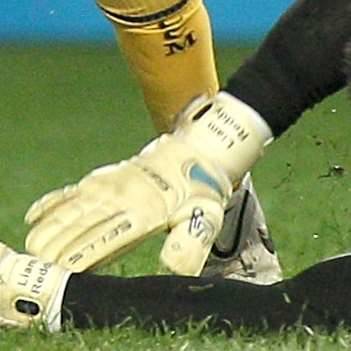Here's a random fact: A broken wrist is the single most common bone fracture in people under the age of 65. Number one. Numero uno.
Here's another - the three main causes are: falling, sports injuries, and traffic accidents.
You know why? Because instinct will take over. Without thinking, your arms reflexively stretch out to break your fall or try to hold off the steering wheel as it rushes towards your chest or head.
It's instinct. If you actually had time to think about it, you'd probably try to do something else as the chances are very high you'll break your wrist.
But when you trip, instincts take over. There's no time to think. It's pure reflex. Your body is hard-wired to take the simplest step to protect your head by stretching your arms out.
You might break your wrists, but your body's instantaneous reactions may at least have stopped you suffering possible brain damage.
Which is why you have to be suspicious of any footballer who goes to ground in a theatrical but deliberately harmless fashion.

Perez's collapse in the box is the perfect example.Our newest picture here - taken from the highest resolution image available of the incident - shows conclusively there was was contact.
You can actually see where Reddy's glove has apparently wrinkled and stretched Perez's sock as it rubs against it.
Reddy had dived for the ball, but Perez's last deft touch moved the ball out of reach of the stretching keeper, and his right arm touches Perez as he runs through.
But it is clearly the keeper's arm/wrist that makes the contact, not a hand grabbing at the player's leg or boot. It appears to be entirely accidental, but was it careless or reckless?
Perez's following half-pike with twist as he crashes to the ground demanded a decision from the referee, some yards behind in a crowded penalty box.
However, Perez's wrists stay safely out of harm's way. It was a controlled fall. He knew what he was doing.
What he was doing was exaggerating the contact for the benefit of the referee to tell him he had been fouled and win a penalty.
Was his elaborate tumble designed to deceive the referee as to the severity of the contact? The Match Review Panel judged it was.
Even Mariners defender Patrick Zwaanswijk admitted it wasn't a penalty, although he said it was playing 'smart'.
You may also ask, if he was genuinely fouled and not playing for the penalty, why did he and Matt Simon do their celebratory handslap after the penalty was awarded?
Or was that because Simon had got away with his handball in the box just a moment earlier when perhaps play should have been stopped anyway?
Perez might well have answers to these questions, but he was denied the chance to voice them.
He's also been denied the chance to appeal against the MRP's decision to ban him for two games.
That is quite clearly wrong.
Just as you think the FFA are moving in the right direction, overturning dubious ref decisions and cracking down on a blight on our sport, they spoil it all with an own goal like that.
The denial of natural justice was a new change to the system for this year - sneaked in under the radar of all but the PFA - and it's a bad one.
That, more than anything, should be overturned as soon as possible.
But that doesn't mean we should condone players going to ground instead of staying upright and trying to score from open play.
There are two issues with diving - one is the pure simulation when a player pretends to have been fouled without any contact at all and collapses. These players deserve to be banned, but they are few and far between.
Then there are those who exaggerate minor contact to milk fouls and penalties. This is a far bigger problem, both in numbers and dealing with it.
My preferred option is that the ref simply waves play on unless he sees a clear, textbook foul - not just a player writhing on the ground after running near another opposing player or the gentlest of contacts between the two.
If the MRP want to go back over the matches and can spot clear, textbook simulation, then let them ban the player and release the relevant footage as part of the process.
But of course give the player the right to defend himself and an avenue to appeal.
Yes, there have been plenty of incidents in the past that should have been dealt with - but that's no reason not to try to start dealing with the problem now, and the other problems in our sport at the first opportunity too.
Sydney's Alex Brosque has one of the worst reputations for exaggerating minor contact in the box - but one of his greatest goals came when he, for once, shrugged off the attention of the defenders, regained his balance and finished beautifully.
Heart's Alex Terra could have scored a fine goal if he could only finish instead of going to ground for the penalty against Glory too. There's no doubt Naum Sekulovski touched his arm...but the contact was not nearly enough to send him crashing to the grass.
Likewise, how good a goal would it have been if Perez had tried just that little bit harder to stay on his feet and slot home the ball? What a heroic debut that really would have been...
All too often though, players are choosing the easy option of playing the ref and playing for the penalty instead of backing themselves to finish the job they started.
It's unAustralian, apart from anything else. We don't just give up and fall on the ground and hope someone takes pity on us. It's the Sally Robbins School Of Sport.
It needs to end now, not just for the sake of entertaining football at a domestic level (but goals like that scored by Adelaide's Marco Flores are more likely to draw fans to the game than any scored from the penalty spot).
The more important issue is that we desperately need players who score goals from open play.
Have a look at the Socceroos - how many top class defenders and midfielders do we have compared to top class strikers?
Can we really rely on our next generation of strikers having rookie refs or Matthew Breeze as the match officials for all our Socceroo games?
We need to stamp out diving, encourage open play, make sure red cards and penalties are the exception rather than the rule, and have an open, honest and fair system for dealing with post match scrutiny.
The message has been sent out to the players and officials - no more simulation or exaggeration.
Give players the right to defend themselves at MRPs and a right of appeal against their decisions IMMEDIATELY.
And in Perez's case, given our new evidence so far unseen by the MRP that there was at least some contact, I'm confident an appeal would find a suspension of his two match ban to be a fair punishment in this instance.
Not because he's a special talent, nor because he might "tear up his contract and go home to Argentina" as was claimed today - hardly the behaviour of a professional.
But just because it is the fair thing to do by everyone...and a fair go really is the Australian thing to do.












